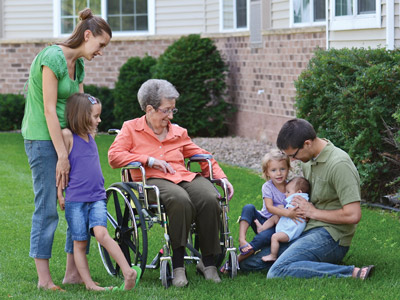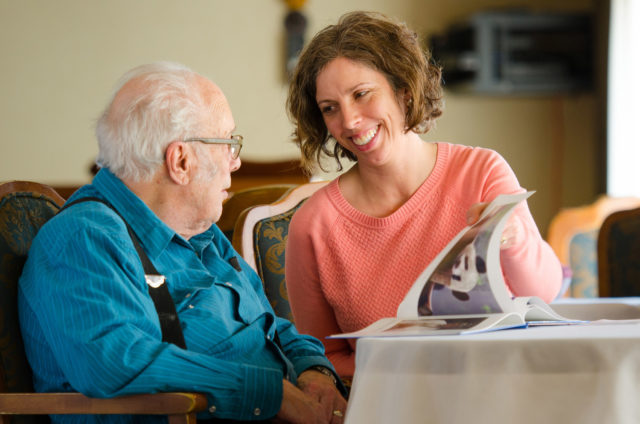If you’re a family caregiver, you know how hard it is to care for your parents. Add other loved ones with health problems and your stress level is bound to be high. Yet, many caregivers are also caring for children at the same time, and are known to most of us as “the sandwich generation.”
What can you do to manage the stress of taking care of loved ones, while still taking care of yourself—especially as the pandemic continues?
First, let’s define “sandwich” caregiving. An estimated twenty-eight percent of caregivers are sandwiched between caring for an older adult while raising children at the same time. Caregivers belonging to the sandwich generation often need to balance the demands of their jobs and their children’s school (or their own).
At this point, many family caregivers may be out of work, due to financial uncertainty created by the pandemic. Family caregivers may live with older loved ones and, depending on the age and underlying conditions of those loved ones, the responsibility of caring can feel overwhelming. This is compounded by the needs of a caregiver’s children.
Overall, caregiving is unpredictable and frequently requires those who provide care to deal with crises. At the same time, by keeping loved ones at home, family caregivers provide enormous value to our community by decreasing the demand on home and community-based services. One example of that value involves not using emergency rooms and hospitals when the situation does not call for it.
Yet, society does not often recognize caregivers for all they do each day. Therefore, it’s crucial for people who provide care to others to find time and ways to care for themselves. At Elk Run, we try to lift caregivers’ burdens by providing respite care when caregivers need time to themselves. We also provide assisted living services on a long-term basis.
As the executive director at Elk Run, I feel privileged to serve older adults and families. I’ve also learned a number of strategies that can be helpful to parents who are also caring for loved ones:
Make sure your boundaries are clear. Be honest with loved ones about what you can and cannot do and say no when you have to do so. Figure out what you need, which could be a half-hour walk or conversations with friends. Be firm about fulfilling your own needs, each and every day.

Simplify and prioritize. Don’t worry about dropping non-essential activities from your life. Above all, you want to be flexible and figure out the best way to simplify your life.
Ask for help! Don’t be afraid to request help from relatives, friends, neighbors or fellow church members if you need help with tasks. Children are certainly able to pitch in and do household chores, and explaining how they are not only helping you but your extended family when doing chores will teach children much about how families really work.
Family members who cannot help with actual caregiving can be asked to help manage finances or provide transportation to doctors’ appointments. Yet, no one can help you do anything unless you ask them.
Communicate clearly and often. Update family members regularly via text, email, texting groups, Google Drive or apps like Caring Village or Lotsa Helping Hands. Both these apps are free and provide tools that invite everyone in the family to participate in the caregiving process.
Plan ahead. Don’t wait for a crisis to start planning what to do if a relative falls or begins to struggle with dementia. Caregiving can last many years, so it’s crucial to have a plan before the need arises. You’ll want to research your local community services, such as respite care and adult day care. Investigate the cost of respite and other services, so you are prepared if and when someone you love needs help.
Talk to your supervisor and employer. Ask about the option to work at home or use flextime in case you need to juggle work and caregiving responsibilities. Find out the policy for paid or unpaid leave benefits at your workplace, as well as how your workplace accommodates family emergencies.
Find balance. Being flexible can help with that. Mainly, it’s crucial that you focus on the needs of your family and your own needs—especially because each day and week will be different. Hold on tight to your resolution to spend time in the garden, go to the gym and enjoy outings with the family. If asked, it’s very likely your loved ones would say they want you to spend time with your children, spouse and friends. By honoring your own needs, you honor theirs as well.
It’s also important to note that family caregivers provide the kind of support and love that few others can, which offers satisfaction and meaning to a life well lived. At the same time, the pandemic has caused more stress than ever to most everyone’s life. That’s why it’s critical for caregivers to take care of themselves while caring for others.
If you are a family caregiver and want to talk through some options, please don’t hesitate to give us a call. We are happy to talk with you—and even happier to listen.

